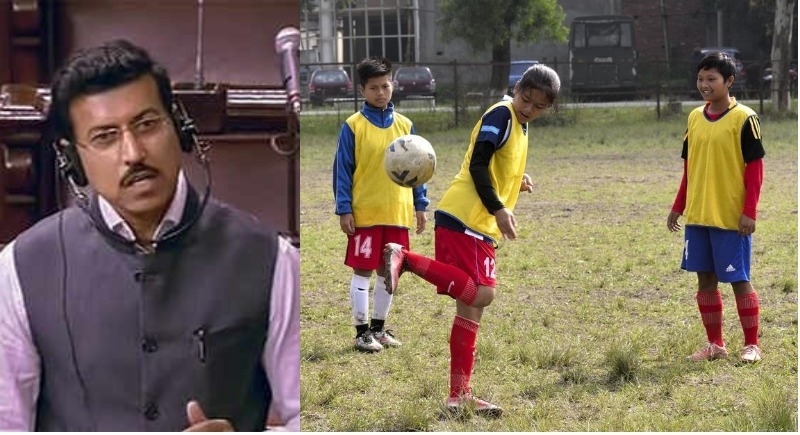Lok Sabha unanimously passes National Sports University Bill to promote sports education in Manipur
New Delhi, August 4: On Friday, the Lok Sabha by voice vote passed a bill to establish a National Sports University in Manipur to promote sports education, research and coaching.

During the discussion, Sports Minister Rajyavardhan Singh Rathore assured the members of Lok Sabha that the university will be set up at a cost of Rs 524 crore and a sportsperson will be the vice-chancellor, and the university’s academic council will also consist of sportspersons.
The Minister further stated that this bill empowers the university to set up outlying campuses throughout the country and also abroad. “The university and its outlying campuses aim to impart training to athletes, sports officials, referees, and umpires and evolve as centres of excellence,” he added.
Rathore also asserted that the government has signed an agreement with University of Canberra and Victoria University for development of curriculum, research facilities and laboratories. The sports minister, in the end, informed members that the government had increased stipend and food allowances of sportspersons by 100 percent and salary of the staff has also been raised.
Technicalities of The National Sports University Bill, 2018 are as follows:
- The bill replaces the National Sports University Ordinance, 2018 that was promulgated on May 31, 2018. The Bill seeks to establish a National Sports University in Manipur.
- Establishment of the University: The National Sports University will be headquartered in Manipur. It may establish outlying campuses (within or outside India), colleges, or regional centres. The University will: (i) undertake research on physical education, (ii) strengthen sports training programmes, and (iii) collaborate internationally in the field of physical education, among others.
- Functions of the University: Key powers and functions of the University include: (i) prescribing courses of study and conducting training programmes, (ii) granting degrees, diplomas, and certificates, (iii) providing facilities through a distance education system, and (iv) conferring autonomous status on a college or an institution.
- Authorities: The University will have the following authorities: (i) a Court, which will review the policies of the University and suggest measures for its development, (ii) an Executive Council, which will be the principal executive body, (iii) an Academic and Activity Council, which will supervise academic policies, (iv) a Board of Sports Studies, which will approve the subjects for research and recommend measures to improve standards of teaching, and (v) a Finance Committee, which will examine proposals related to creation of posts and recommend limits on the expenditure of the University. Further, additional authorities may be declared through statutes.
- Executive Council: The Executive Council will be responsible for all administrative affairs of the University. Members of the Council will be nominated by the central government and will hold office for two years. The members will include: (i) the Vice-Chancellor (appointed by the central government), (ii) the Joint Secretary, Ministry of Youth Affairs and Sports, and (iii) four persons from among eminent sports persons and distinguished coaches.
- Key functions of the Council include: (i) creating academic posts and their appointment, (ii) managing the revenue and property of the University, (iii) managing and regulating the finances of the University, and (iv) partnering with industry and non government agencies to advance knowledge.
- Statutes: The Schedule to the Bill contains statutes. These statutes specify the establishment, composition, and powers of various authorities such as the Chancellor, Vice Chancellor, and Dean of Schools. The Executive Council may make additional statutes, amend specified statutes, or repeal these statutes. Any such action will require the approval of the central government.
- Role of central government: The central government will review and inspect the functioning of the University. The Executive Council may take action based on the findings of the inspection. If no action is taken within a reasonable time period, the central government may issue binding directions to the Council. In addition, the central government may annul any proceeding of the University which do not conform with the Bill.
- Fund: The University will maintain a Fund. The following amounts will be credited to the Fund: (i) contributions by the central government, state governments, or the University Grants Commission, (ii) loans, gifts, and donations, (iii) income from fees, and (iv) amounts received from any other source. Funds will be invested based on the recommendations of the Finance Committee.
- Dispute and appeals: Any student or candidate whose name has been removed from the rolls of the University and who has been barred from appearing for examinations may appeal to the Executive Council for review of the decision. Any dispute arising out the disciplinary action taken by the University against a student may be referred to a Tribunal of Arbitration (at the request of the student). Disputes arising out of the contract between an employee and the University may also be referred to a Tribunal of Arbitration.